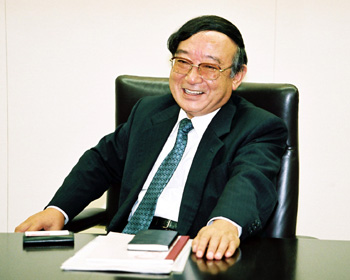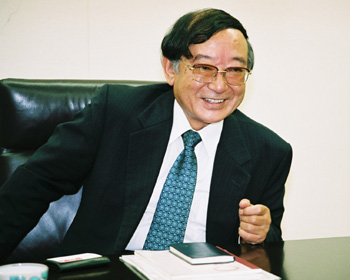| “It is the final year of
our three-year plan and our immediate objective is to accomplish
our goals of this plan,” explains Kawabata. Although this “determination”
might seem not so exciting, Denka is eager to achieve a numerical
target in this plan to earn “at least 10% in operating margin.”
Moreover, the plan in question was actually proposed by Kawabata
himself under the leadership of former president (current chairman)
Toshio Hiruma. In that sense, even after Kawabata became president,
his path was clear. He was glad to stick to the slogan of “targeting
to be a company that grows steadily and achieves high profitability.”
|
| Chemnet: What has changed for you since you promoted from executive director to president?
|
| I am much busier. When I
was senior managing director I could fix my own work program
and proceed, but now my schedule is fixed for me. I had no
idea of being company president would involve so much work!
|
| C: Denka has shown good performance in financial results, with an increase in both income and profits for consecutive four fiscal years. You must have high hopes of better record for the next (fifth) year? |
| Yes, it is true. The results
are good. Denka has been struggling in various ways at the
right moment since the era of Tsuneo Yano, our former chairman.
In 1996, ten years ago, it was the era of the so-called price
collapse, in fact, our company was also slow. Consequently
we implemented the “TC-10” campaign, which meant decreasing
our total costs by 10%. For example, if our total costs were
\100 billion, reduced costs would be \10 billion. This involved
revising and improving our cost structure of everything, including
even labour costs and depreciation. We accomplished the purpose
and our financial standing was also greatly improved.
|
| C: At that time Denka actively pursued corporate alliances with other companies, didn’t you? |
| Yes. Even though we had
a volume of sales in the petrochemical field, the profits were
relatively small. As a matter of fact we obtained steady profits
from our carbide based business made with our own power generating
facility and form limestone resources. These products such
as calcium cyanamide, fertilizer, and chloroprene rubber, or
well balanced synthetic rubber, are still bringing in consistent
profits.
In petrochemicals, there has been a repeated pattern of steep
rise in the cost of raw materials with the prices down of our
products. We had no choice but to go for the larger scale as
a manufacture. Since it turned out to be ineffective, we form
corporate alliances focusing on general-purpose products. We
transferred our vinyl chloride business to Taiyo Vinyl, and
for polystyrene, we established Toyo Styrene with Nippon Steel
Chemical and Daicel Chemical Industries. |
| C: So you were not going only for the large scale, but also for specialized products? |
| As we have various kinds
of highly functional product, we came to a conclusion to concentrate
on strengthening our specialized chemical field.
In the Hiruma era we implemented “Innovation 22.” It was a
strategy to review our internal organization and operating
systems to reform our corporate structure. Furthermore, in
2004 we launched “New Stage 2006 (NS06).”
We are working towards the specific goals, numerical targets
of, at least 10% in operating margin, a shareholder’s equity
ratio of 50% or above, and ceiling for interest-bearing debt
of 65 billion yen. It is the final year for this three-year
plan. |
|
C: Are you getting close to your goals?
|
|
No, not yet. We have managed to raise our operating income
margin up to 9% however there still remain 1% more. We are
now focusing on efforts to achieve extremely short-term objective,
“OP+1(operating profit plus one).” It can be summarized as:
“Do our best to get the last 1%!”
|
|
C:, What ambitions and next management goal do you have as a president?
|
|
First of all I intend to complete the projects we’ve been
working on so far. Since the plan scheduled to be ended on
March 31 2007, it is important that we work hard to achieve
the objectives of the plan. I was involved in this NS06 program
from the start. Only after accomplishment of the targets, we
shall set next goal.
|
|
C: Will there be any changes in three priority areas of growth you have focusing on ? “Functional resins,” “Electronic materials,” and “Plastic products?”
|
|
These three will not change. The important matter is how
to build up and expand each area in an efficient way. Some
fields are already doing well. In the electronic materials
segment, we have integrated the research and development with
production at Shibukawa plant, which previously been carried
out separate in order to respond to market needs more promptly
and more appropriately.
Currently we are also expanding the scale of functional resins.
In Singapore we have constructed plants for the ultrahigh molecular
weight polystyrene (MW), transparent resin (MS resins), and
SBC resin (Clearen), for plastic bottle shrink labels, and
will start production in the latter half of this fiscal year.
The total production capacity of these resins will increase
from current level of 100,000 tons to as much as 250,000 tons.
In plastic products segment, after merging former Toyo Chemical,
we established our organization first. However there were various
types of products, such as packing materials, electrical insulation
tape, packing tape, gutters, synthetic-fiber for wigs, we intended
to streamline our factories and make optimum production system.
Thus two of three fields have been established and the rest,
plastic products, is in progress. Our foundation of priority
fields will be much strengthened in the near future. |
|
C: Does your company have any new technologies or new products on the horizon?
|
|
Big-ticket products come out not so often. However, among
our existing products, many are highly evaluated in their market
and have promising prospects. Products such as alumina short
fibers “Alcen”, special synthetic rubber “ER,” are selling
well. Since ER has superior character in both heat resistance
and oil resistance, its needs with automobile parts is growing.
As those examples indicate, Denka has intended to follow the
“cluster strategy.” They don’t have to be big-ticket. We develop
several items with sales volume of \400 - \500 million per
year and grow them in our cluster. |
|
C: The fact that your basic operations
are in such good shape is one of your strengths, isn’t it?
|
|
Behind the fact that Denka has continued to increase income
and profits, there is a steady growth of limestone and carbide-related
business that once considered to be no room for growth. At
the moment chloroprene rubber is getting a deal of attention.
In addition a certain foreign manufacturer has withdrawn and
the supply ability for our products is not sufficient.
We are therefore considering an expansion of capacity of chloroprene
rubber at Omi plant. To expand it, we have to study whether
there is extra capacity in our private power-generating facilities
and would reinforce acetylene- generating equipment etc., however
we are eager to utilize our limestone resources and hydroelectric
plants as our strong competitiveness.
Our pharmaceutical product “Suvenyl” has kept developing and
the demand is close to its maximum production capacity. We
have facilities to produce approximately six to seven million
units a year and we intend to expand its capacity to ten million
units.
In electronic materials area, the demand for our spherical
fused silica filler for semiconductor sealant is increasing,
due to its special property of low environmental impact. We
have plants both in Omuta and Singapore, and we are proud of
the world’s top share. We are planning to equip sufficient
capacity to be able to supply even when its demand reaches
a peak.
|
| C: What kind of prospects do you have concerning Denka? What are your expectations to your employees in the future? |
| Denka aims to be “a company
with steady growth and high profitability.” To achieve that,
it is essential that we have outstanding, strong products with
sufficient supply capacity.
This is the 92nd year since our foundation. Therefore our
100th anniversary is not so far away. We would like to invest
on infrastructure for our plants to reinforce our facilities
in relation to environment, safety and health. So far Denka
has made steady progress and now it is a time to look back
and reflect on our efforts. And then we will be ready for the
next 100 years!
All employees of our company are serious, very dedicated to
work and have also very solid spirit. However, it is not enough
to be just waiting for instructions. I would expect them to
carry things out by themselves in an remarkable ways. That
will also lead to the achievement of our management goals. |
|


